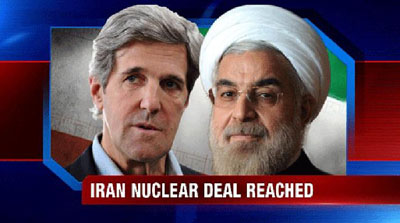A new CNN / ORC poll just revealed that the majority of Americans want Congress to reject the nuclear deal with Iran that the Obama Administration negotiated. This is a shift from April, 2015 when the majority favored approval of the deal.
It might be farcical that the American people are asked their views on the deal; it’s very complicated and hardly anyone has read it. On the other hand, we’re all entitled to engage in “gut politics” in which we intuitively make judgments about whether or not we can trust an individual or a policy.
The problem with the second approach, the “gut approach,” is that we are more susceptible to emotional appeals, particularly when they are blasted upon us by the electronic media. No sooner had Secretary of State John Kerry concluded the arduous negotiations with the Iranians and five allies than right-wing organizations began saturating the American airwaves with fear-mongering ads that as always, present only partial information and a lot of disinformation.
We have previously written about how the nuclear deal is somewhat similar to the fast-track consideration of the Trans-Pacific Partnership that President Obama narrowly shepherded through Congress. It’s complicated and does not lend itself to easy consideration. However, a fundamental difference between the two is who the opponents of each is.
In the case of the TPP, those who opposed the President’s stance were primarily his traditional supporters, workers, labor unions, environmental groups, consumer groups, and progressives in general. In the case of the Iran nuclear deal, those opposed are mostly Republicans, most vehemently those who have sworn to do whatever they can to undermine virtually anything that he supports. These people are bankrolled to the hilt and can roll out one ad after another to scare Americans about the Iran deal. Those who opposed the TPP were of limited means and also somewhat reluctant to dumb down the conversation with 30-second fear pieces.
While I am not a nuclear scientist and cannot personally vouch for the scientific veracity of the agreement, I am pleased that one of the top American negotiators was Secretary of Energy Ernest Moniz, former professor of Physics and Engineering Systems at MIT. He and most other scientists who understand nuclear physics support the deal. This is somewhat like climate change; those with the knowledge support reform; those who are largely ill-informed resist taking reasonable action to address a true threat.
It’s not just the United States that entered the deal with Iran, it’s also countries as disparate as Russia and China, Germany, France and the United Kingdom. All but Germany are permanent members of the United Nations Security Council. On July 20, 2015, the ten non-permanent members of the Council joined the permanent members to give unanimous endorsement of the agreement. Those countries are Angola, Chad, Chile, Jordan, Lithuania, Malaysia, New Zealand, Nigeria, Spain and Venezuela.
The fact that the agreement is supported by so many scientists and so many countries is reason, though not assurance, that it is a good deal. One of the problems that President Obama has had in trying to sell the deal is that neither he nor anyone else can guarantee or assure that Iran will not develop nuclear weapons sometime in the future. What’s unfortunate is that opponents of the deal cannot accept the simple truth that there is no way to prove a negative; that something won’t happen. That leaves you with relying on the best information available. This is certainly a far shot better than Congress disapproving the deal and overriding his veto. Then whatever guarantee exists now will be destroyed and the likely outcome will be war with Iran and further isolation of the United States from other countries in the world.
Maybe supporters of the deal will have to take to the air waves, but as we all know, it’s difficult to overcome Republicans pandering to fear.
